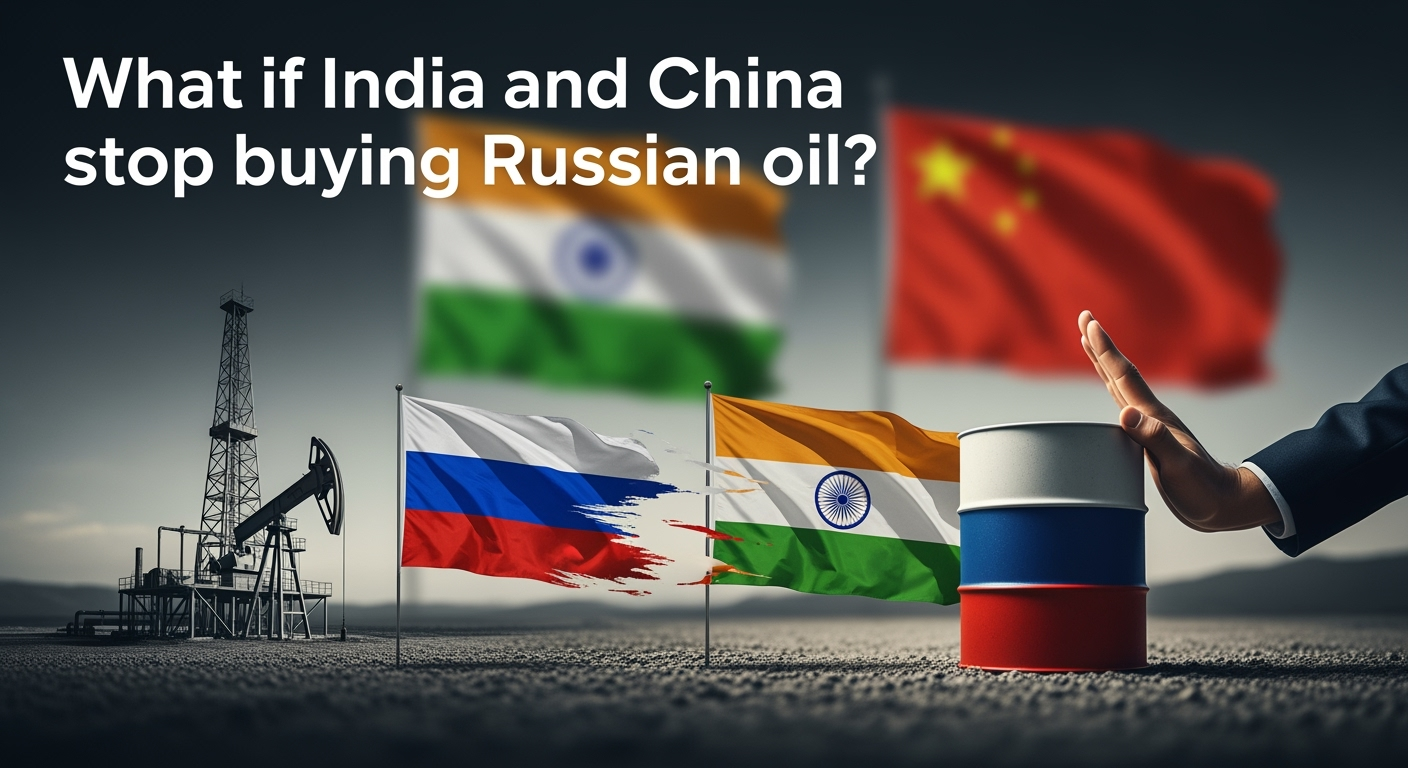Related Articles

China's Ambitious Pursuit: Challenging America's AI Dominance




The global energy landscape faces a potential upheaval as the hypothetical scenario of India and China, the two largest importers of Russian oil, ceasing their purchases comes into sharper focus. This development, driven by evolving geopolitical pressures and economic considerations, could trigger profound consequences for Russia's economy, the energy security of these Asian giants, and the stability of international oil markets. Recent statements from former U.S. President Donald Trump, claiming a pledge from Indian Prime Minister Narendra Modi to halt Russian oil imports, have amplified speculation, despite New Delhi's lack of official confirmation. Should such a dramatic shift materialize, the ripple effects would reverberate across continents, reshaping trade routes, pricing mechanisms, and geopolitical alignments.
Since early 2022, following Western sanctions imposed on Russia after its invasion of Ukraine, India and China emerged as Moscow's primary oil customers, capitalizing on significant price discounts. Prior to this period, Russian crude constituted only a small fraction of India's imports, but it rapidly surged to become India's top supplier, accounting for approximately 35% to 40% of its total crude oil purchases. Similarly, China cemented its position as the leading importer of Russian crude, liquefied natural gas (LNG), and coal, absorbing 47% of Russia's crude exports, with India following at 38%. For both nations, the decision to import discounted Russian oil was largely an economic one, aimed at securing affordable energy supplies crucial for their vast populations and industrial growth, thereby bolstering their energy security. India alone has reportedly saved billions of dollars through these discounted purchases. This pivot eastward by Russian oil exports has been instrumental in mitigating the financial impact of Western sanctions on Moscow.
The potential cessation of oil purchases by India and China would deliver a severe blow to Russia's economy, already grappling with international isolation. Russia would face the loss of its most significant buyers, leading to a substantial reduction in export revenues. This situation would force Moscow into an even deeper reliance on its remaining energy partners, primarily China, potentially granting Beijing increased leverage over Russian energy pricing and policy. Furthermore, Russia would confront the formidable challenge of identifying alternative markets for millions of barrels of oil per day, a task complicated by existing logistical constraints such as limited tanker availability, insurance restrictions, and port capacities. Such a scenario would accelerate Russia's strategic and economic pivot toward Asian markets, fundamentally altering its long-term energy export strategy.
For India and China, ending Russian oil imports would necessitate a complex and potentially costly recalibration of their energy strategies. India's annual crude import bill could swell by billions of dollars, with estimates suggesting an increase of at least $10 billion if it loses access to discounted Russian supplies. Indian refiners would be compelled to seek alternative suppliers from regions such as the Middle East, Africa, and potentially the United States, likely at higher market-linked prices. This shift would invariably translate into elevated costs for petrol and diesel for consumers, drive up input costs across the transport and manufacturing sectors, and exert upward pressure on food prices due to more expensive logistics. Economically, a higher trade deficit could place downward pressure on the Indian rupee, while increased reliance on OPEC+ producers might expose India to greater vulnerability from sudden supply shocks. While India has actively diversified its oil sources to around 40 countries, including the Middle East, Africa, the U.S., Guyana, Brazil, and Canada, the sheer volume currently supplied by Russia makes an immediate, full replacement a challenging prospect. Some Indian refiners are reportedly preparing for a gradual reduction, acknowledging the difficulties of an abrupt halt that could trigger price surges and domestic inflation. China, already a dominant buyer, would also need to navigate complexities in absorbing any displaced Russian oil or finding new sources if it were to cease imports, balancing its energy security needs with geopolitical considerations.
On a global scale, the ramifications of India and China withdrawing from the Russian oil market would be profound, sparking significant market volatility and potentially instigating geopolitical realignments. A sudden reduction in demand for Russian crude by these two giants would tighten global oil markets, potentially leading to a sharp increase in Brent and West Texas Intermediate (WTI) crude prices. Some analysts have even suggested a potential surge to $200 per barrel in such a scenario. Such a price spike would impact consumers worldwide and could benefit other oil-producing nations, such as Saudi Arabia and the United Arab Emirates, as countries scramble to secure alternative supplies. While market rebalancing would eventually occur, logistical bottlenecks due to tanker availability and port capacity could cause short-term disruptions. Beyond immediate price shifts, this move could accelerate the fragmentation of global energy trade into distinct political blocs. There is also the potential for an intensification of de-dollarization trends, as Russia and its remaining trade partners might increasingly resort to non-dollar settlement systems, challenging the U.S. dollar's long-standing dominance in energy trade. The evolving dynamics underscore a delicate balance between economic pragmatism, national energy security, and intricate foreign policy objectives for all major players involved.
In conclusion, the hypothetical withdrawal of India and China from the Russian oil market represents a complex convergence of economic, political, and strategic factors with far-reaching global implications. While the economic imperative of discounted oil has cemented the current trade relationship, persistent external pressures and the need for long-term energy diversification continue to shape the strategic calculus of New Delhi and Beijing. Should these nations indeed cease or significantly reduce their Russian oil imports, Russia would confront substantial economic hardship, while India and China would face the challenge of securing alternative, likely more expensive, energy supplies. The global oil market would undoubtedly experience heightened volatility, price surges, and a potential acceleration of geopolitical realignments. The intricate web of interdependencies within the global energy system ensures that any significant shift by major consumers like India and China would create cascading effects, underscoring the delicate equilibrium that governs international energy trade in a multipolar world.